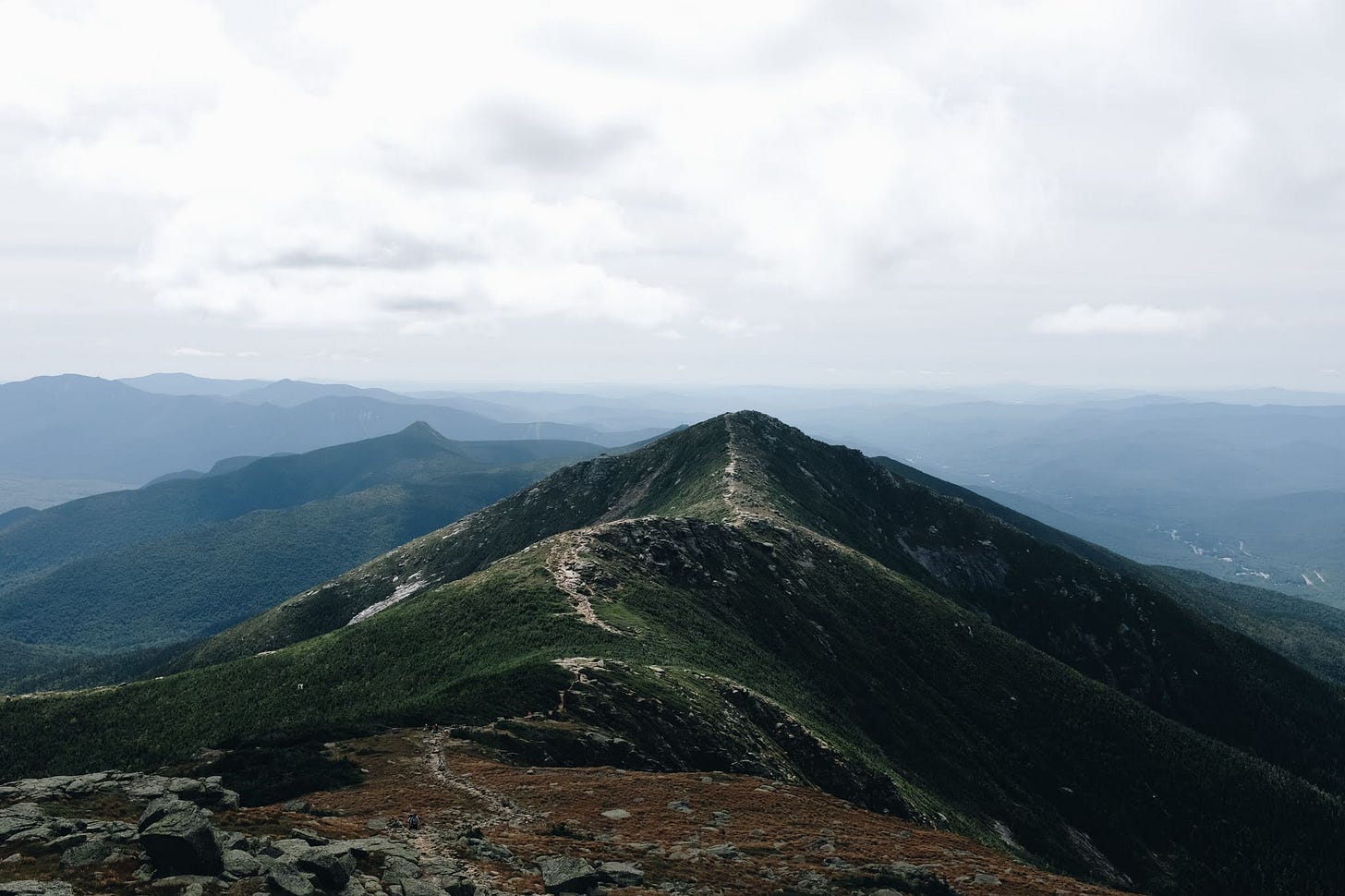Where to Live
disjoint thoughts
Dear friends,
I am a provincial person. I have lived in New Hampshire for almost my whole life, a few thousand feet from the hospital where I was born. Sometimes I tell people I have never been to America, for I’ve never seen Chicago, or LA, or Houston, or anywhere outside of New England really. I haven’t even gotten around to visiting New York City, though it is only a 4 hour drive away. (I will go some day, to see the museums, and to get fat on all the good food you cannot get here.) When I have means to travel I cross the Atlantic, mostly, though I have been to California.
Today I live ten miles from my birthplace. As a web developer I’ve forgone some opportunity in order to stay here, where I'm in a sort of professional solitary confinement. It's hard to know if its been the right move (professionally, intellectually, etc) — If it wasn't for Twitter and Hacker News I might go crazy, so I am deeply thankful for them making my home professionally bearable. And while I love New Hampshire, I’m not sure it loves me, and I can never find the words I would need to justify it over every other place. So this is not a post persuading anyone to come here!
One reason I stay in New Hampshire: An ideal to me is to live outside the city when young, try to have a home, a workshop, possessions. You can have the space to accumulate raw materials and tools and knowledge, learn through the works of your hands. Have a place to make babies and give them the materials they need to create, too. Instead of chasing night life, use your time to learn what it is you really like to build. You can visit the city often, of course! Just not live inside it. Then, when you are older and your kids are grown, you part with your possessions easily, perhaps giving your kids a hand starting their own homes in the process. By then it is onerous to maintain things, and you should want to be more focused (ten hobbies instead of one hundred). Perhaps then you could easily move into a small pad in the city. Of course, the careerism trade-off is clear, as long as your eyes are open to what you’re trading off.
Another reason: Cities seem to exert themselves on people, like a kind of peer-pressure, and they do it so thoroughly I’m not sure the people inside the cities fully know it. The world loosens its grip out here, as Du Fu said. While it is easy for city dwellers to call everyone else unsophisticated, it is plain to everyone else that people who spend their lives as city dwellers tend to collect neuroses.
The way to live healthily in a city is to have country-dwelling friends or relatives and visit them often. Centuries ago many professionals would compress their working time in the city to one week a month, and stay in the country otherwise. That sounds lovely, but today people don't have enough relatives, maybe, and I think the nature of cities has changed too. Cities should not escape nature, but almost all of them now have buffer zones of sprawl. The city becomes a kind of monstrosity when it ceases to be part of rural life, but most cities in the US have this disconnect. It is unfortunate that cities offer so "much" (jobs, experiences, etc), since they have become this way. It clearly hurts the country too. If they were more connected, both would be better off. There would certainly be more babies.
~ ~ ~
I cannot tell you where to live because—aside from only living in one place myself—I do not know what you value. But it is worthwhile to think of your ideal life, what you want and when, and work backwards from there, and thinking of it often. Man is a forgetful creature, just as we become estranged from our former selves we quickly become estranged from our own goals and dreams unless we continuously try to remember them. (Thus it is possible that a person who “wants kids some day” might sleepwalk through a few decades and suddenly find their wants difficult, find themselves pressed for time, etc.)
Any place you live should help you further your dreams. You should not live out your 20’s as a single person in rural Maine if you wish to start a family. You should not live in a shoebox in NYC if you wish to learn timber framing. Beyond taking your life’s goals seriously and orienting where you live around them, there are probably a number of places you could be perfectly happy. As I wrote the title of this post I was thinking of the end of Du Fu’s poem by the same name:
Where to Live, by Du Fu (712 – 770)
West of the Flower Washing Stream,
not far downstream from the bridge,
the master has chosen a quiet spot
here in the woods by the river.
Living apart from the city crowds,
the world loosens its grip;
murmuring of this clear water dissolves
the sadness that burdens a stranger.
Countless dragonflies play in the air,
dancing up and down;
a pair of wild ducks out in the stream
swim and dive together.
You could take a boat downstream,
thousands of miles to the east
or else forget the boat, and live
here by this stream forever.
~ ~ ~
What matters more than finding the most perfect location is what you do when you get there. Many people seem to live in such a way that if they were dropped off in a different house in a different suburb of a different state, they almost wouldn’t notice, as long as their house had a TV and internet and the the GPS still lead them to a Starbucks. The really important thing isn’t where you live exactly, but being embodied in your living regardless of where you are. Perhaps that’s the interesting topic here, but it will have to wait for now.
~ ~ ~
An old tale: Once there grew a giant oak tree, so large that it took hours just to walk around it—from this you can imagine it’s enormous height and the spread of its branches. As the sun rose and set the oak would shade entire provinces, one after the other, and the strongest winds would hardly shake its smallest branches. With their fields in the shade, the peasants complained of poor harvests, so they asked the king to cut down the oak. The king obliged, sending one thousand men with axes, and once the tree was felled it provided firewood for five hundred years. The peasants have had good harvests ever since.
Now what could this story mean?
I found this difficult to write, I feel I have answered nothing, these last few weeks lend only a sleepy nature to my thoughts. Alas,
s s
be sure to read Familiarity and Belonging, next




All great tragedies (even inside stories which are heroic) live in the conflict between virtues or needs. Frodo wants to save the world and no longer wants his burden, but by the Gods does he also want that ring. The people would have done well to live under that growing oak, but they also needed to grow food for themselves. I want to live on a river more than I can describe, but my family decided to move to a place where there isn't a major river for three hundred miles. So... what to do?
Frodo almost failed, while the men and women in that story killed a wonder and yet lived. I chose to be in the same town as my parents, and it's been great. But I miss the river like an amputated limb.
Simon , have only discovered you in the last few days (5/21) and was delighted / surprised that you were in New Hampshire - after growing up NYC I moved to the coast of New Hampshire 35 years ago...more of a calling really than a choice...